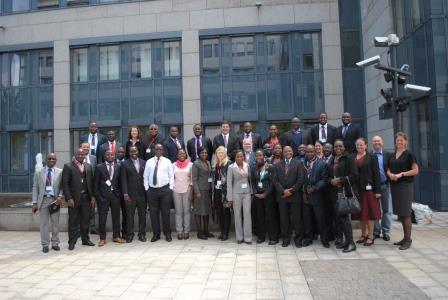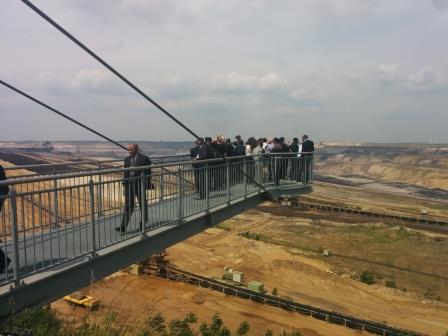With the assistance of the GIZ Academy for International Co-operation, SAI representatives from Ghana, Kenya, Malawi, Mozambique, Tanzania, Uganda and Zambia gathered in Germany I June to exchange experience and build competence in audit of the extractive industries. Colleagues from SAI Brazil, SAI Estonia and the EITI secretariat in Oslo also contributed to the event, which will see a follow-up training in Uganda in September. The results of the workshops will be shared with the WGEI in a discussion paper.
by Sandy Richter, GIZ
SAIs, in ensuring effective external oversight and scrutiny of public sector activities in extractive industries, face considerable challenges in establishing whether they are in line with the principles of legality, regularity, economy and efficiency. Limited knowledge and understanding of extractive industries are major challenges for SAIs, particularly when seeking to develop the audit scope and criteria for the sector. In addressing this issue, the SAIs from seven African countries came together with the German technical co-operation support (GIZ), to develop approaches and strengthen capacity in their important work in this challenging sector. Their collective aim was to contribute to improved accountability and transparency through more effective and efficient scrutiny of public sector activities in the extractive industries. The training approach was intended to underpin and complement regional and global initiatives in the audit of extractive industries, such as the work of AFROSAI-E and the INTOSAI Working Group on Extractive Industries. Additional collaborative efforts include the bilateral partnership programmes involving the SAIs of Uganda, Tanzania, Ghana, Zambia and Norway.
Training in Germany 14-27 June
The GIZ Academy for International Co-operation supported a training workshop from 14 to 24 June in Germany. 27 participants from the SAIs of Ghana, Kenya, Malawi, Mozambique, Tanzania, Uganda and Zambia shared their experiences in the audit of extractive industries. These shared experiences enabled the development of more informed and integrated approaches to the audit of public sector activities in extractive industries.

Oil and gas sector experts from Brazil, as well as representatives from the EITI secretariat in Oslo and the Estonian SAI, jointly carried out the training workshop. The experts’ presentations provided essential knowledge and understanding related to the EI value chain, including fundamental regulatory aspects, licensing and contracting issues, monitoring and oversight in production, as well as fiscal regimes and taxation. The participants took advantage of opportunities to apply the knowledge gained through group activities that resulted in, for example, the development of an audit matrix with specific audit titles, objectives and questions. A highlight of the training, which completed the training experience, was a visit to the Federal Court of Auditors and a guided tour of the lignite mines in Hambach.
A key result and benefit of the training is a series of options, which participants prepared through SWOT analysis that the SAIs can use to strategically conduct audit activities in the extractive industries sector.

Follow-up training to be held in September
The experiences and knowledge that the participants gained in the training, as well as the results of the various group activities, will now be taken to the next level in a regional workshop this September, in Uganda. The objective will be twofold:
• Firstly, to develop strategies for the improvement in the oversight of public sector activities in the national extractive industry sector; and
• Secondly, to design a capacity development strategy for SAIs, which is based on their needs regarding the fulfilment of their role in the sector.
The results of the workshop will form a platform for SAIs in enhancing oversight in the sector and making a valuable contribution to the Good Governance Agenda. These results will be shared with the INTOSAI Working Group on Extractive Industries in the form of a discussion paper.





